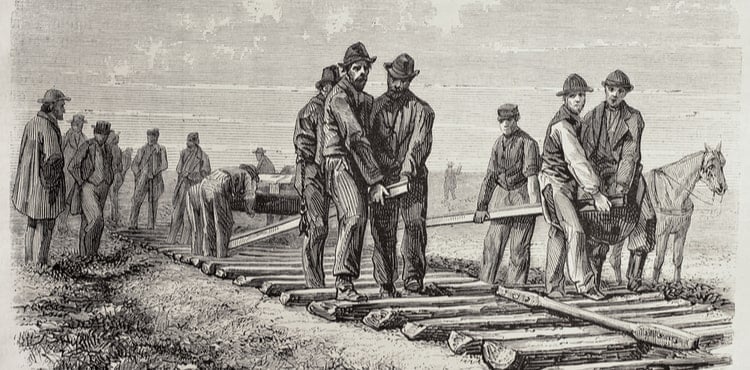A brief history of workers’ compensation

Ever wonder how workers’ compensation insurance came to be? Monetary compensation for an injury is an ancient concept – but it took a surprisingly long time for the United States to embrace it.
A 4,000-year-old idea
Ancient Sumer – present-day Iraq – was perhaps the first to implement workers' compensation. In 2050 B.C., ancient Sumerian law outlined compensation for injury to a worker’s specific body parts, according to Gregory Guyton’s "A Brief History of Workers’ Compensation." For example, the loss of a thumb was worth half the value of a finger.
Ancient Greek, Roman, and Chinese laws implemented similar systems for specific injuries and the monetary compensation the maimed parts deserved. Their distinction between impairments (the loss of function of a body part) and disabilities (the loss of ability to perform certain tasks) still informs workers’ compensation laws today.
'Death contracts' and other roadblocks
The rise of the Industrial Revolution meant extreme working conditions in early factories. Hazards were plenty, and injury rates were colossal. Though hurt workers rarely received compensation, they could turn to the courts for help.
However, the legal framework for compensating injuries was exceptionally restrictive – so restrictive that the following principles became known as the “unholy trinity of defenses.”
If the employer could prove these to be true about the injury, the worker couldn’t claim any compensation:
Contributory negligence. The employer wouldn’t be held liable if the worker was responsible for his own injury, regardless of how hazardous the machinery or work environment was. So if a worker slipped and lost a hand, they wouldn’t receive compensation.
The “fellow servant” rule. If a fellow employee caused the worker’s injuries, employers were not held liable.
Assumption of risk. This doctrine held that employees accepted the hazards of their work when they signed their contracts. To make matters worse, many industries had employees sign contracts that relinquished their right to sue for injuries. That’s why these unfair documents earned the grim moniker “death contracts.”
The rise of Realpolitik in Prussia would usher in the end of these dark times for workers. Chancellor Otto von Bismarck implemented a system of social insurance, known as the Employers’ Liability Law of 1871. This provided some social protection for workers in certain factories, quarries, railroads, and mines.
In 1884, Bismarck championed workers’ accident insurance, which laid the groundwork for workers’ compensation insurance in the United States.
Workers’ comp trickles to America
The trend toward compensating workers for occupational injuries did not come quickly to the United States. It took Upton Sinclair’s 1906 novel "The Jungle," which details the horrors of Chicago slaughterhouses, to stir the public’s outrage.
Eventually, Congress passed the Employers’ Liability Acts of 1906 and 1908, which made contributory negligence doctrines less restrictive. Between 1898 and 1909, New York, Maryland, Massachusetts, and Montana attempted and failed to pass workers’ compensation acts.
Wisconsin passed the first comprehensive workers’ compensation law in 1911, while Mississippi was the last state to jump on board in 1948. These early laws required employers to provide medical and wage replacement benefits for injured workers. If the injured employee accepted these benefits, the employer could not be sued.
Today, this basic structure for workers’ comp is essentially the same. Most states require employers to carry workers’ compensation insurance for full- or part-time employees. You can learn more about your state's laws in the guide "Workers' compensation insurance laws by state."
Why workers’ compensation insurance matters
Workers’ compensation insurance is a necessary safeguard for the present-day workforce. This insurance and its legal requirements are designed to protect employees from risking their health, safety, and assets for their jobs.
Worker’s comp can provide coverage when:
- An employee is injured at work and in need of medical attention.
- An injured employee needs time to recover and cannot afford to miss wages.
- An occupational injury kills or disables an employee.
- An employee waives benefits and decides to sue the employer for negligence.
Employers are protected from the high cost of occupational injuries and the employer benefits, too. Most workers' comp policies include employer’s liability insurance, which covers the cost of an employer's legal defense, settlements, or judgments when an employee sues over a work injury.
Employers can also cover themselves with a workers’ comp policy to guard against the risk of suffering a work injury or illness. To learn more about workers' comp costs, read "How much does workers’ compensation insurance cost?"

Compare workers' compensation insurance quotes with Insureon
Insureon helps small business owners compare quotes for workers' compensation and other types of business insurance with one easy online application. Start an application today to protect your employees and your business.
Jen Matteis, Content and Production Editor
Jen is an expert on small business insurance, a talented writer, and meticulous editor. She’s written and edited hundreds of articles to help inform small business owners about their insurance options. Prior to joining Insureon in 2018, Jen served as a senior copywriter at a digital marketing agency, and as a writer and editor for newspapers on both coasts. In her spare time, she writes fiction.









